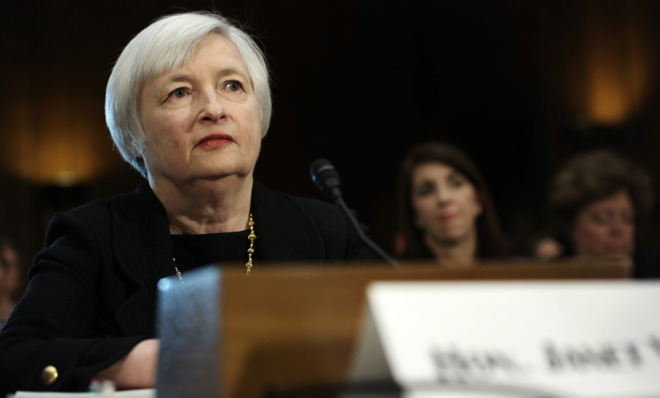Janet Yellen's Federal Reserve confirmation hearing: 3 takeaways
There's more than meets the eye when it comes to the Fed's vice chairman

A free daily email with the biggest news stories of the day – and the best features from TheWeek.com
You are now subscribed
Your newsletter sign-up was successful
On Thursday, President Obama's nominee to lead the Federal Reserve, Janet Yellen, fielded questions from the Senate Banking Committee during her confirmation hearing. While Yellen is widely expected to be confirmed to replace Ben Bernanke at the helm of the central bank, the hearing offered her a chance to respond to the pressing questions surrounding her candidacy, including her position on the Fed's extraordinary quantitative easing (QE) program, which has pumped tens of billions of dollars into the economy every month.
The current vice chairman of the central bank, Yellen defended the Fed's policies overall, saying in her opening statement that the economy is "significantly stronger" than it would be without them.
Here, a few points about the hearing.
The Week
Escape your echo chamber. Get the facts behind the news, plus analysis from multiple perspectives.

Sign up for The Week's Free Newsletters
From our morning news briefing to a weekly Good News Newsletter, get the best of The Week delivered directly to your inbox.
From our morning news briefing to a weekly Good News Newsletter, get the best of The Week delivered directly to your inbox.
1. On tapering, more of what Ben Bernanke was selling
When asked about QE, Yellen walked a careful line, saying there were "dangers on both sides" to prematurely winding down the program, a process widely referred to as tapering. The Fed currently purchases $85 billion worth of Treasuries and mortgage-backed assets every month, in a bid to keep interest rates low and encourage lending.
"It's important not to remove support, especially when the recovery is fragile and the tools available to monetary policy should the economy falter are limited," she said, while also stating, "I would agree that this program cannot continue forever, that there are costs and risks associated with the program."
Ben Bernanke could not have said it better himself. Again echoing her boss, Yellen said she would only consider ending QE once the unemployment rate shrank to about 7 percent. "What the committee is looking for is evidence that we have growth that is strong enough to promote continued progress in the labor market," Yellen said.
A free daily email with the biggest news stories of the day – and the best features from TheWeek.com
Near the end of the hearing, Jon Hilsenrath of The Wall Street Journal put it like this:
The big message from Yellen so far: No regime shift. On monetary policy, bank oversight, and fighting bubbles, Yellen is defending the Bernanke agenda and signaling she'll continue it. This makes sense. She's been his deputy for the past three years and had a hand in formulating all of his policies. [The Wall Street Journal]
2. Yellen sees no bubble, but if she did, she would pop it
Zeroing in on a potential risk of quantitative easing, Sen. Bob Menendez (D-N.J.) asked if Yellen thought all that easy money may be causing bubbles on Wall Street. Her answer: "Stock prices have risen pretty robustly, but I think that if you look at traditional valuation measures...you would not see stock prices in territory that suggests bubble-like conditions."
Yet, when Sen. Bob Corker (R-Tenn.) asked if she would have the courage to "prick" bubbles when they did arise, Yellen said, "I believe that I would."
The idea that the central bank could intervene so forcefully in the economy is a relatively new one, but gained much traction following the financial crisis, when many critics said the Fed could have done more to prevent a massive housing bubble from emerging.
3. She's not as dovish as you might think
In the months leading up to Yellen's nomination, the biggest complaint from her critics was that she was too dovish — meaning she prioritized reducing unemployment by keeping interest rates low, over the central bank's other mission of holding down inflation.
At today's hearing, Yellen provided some evidence to the contrary. Corker asked Yellen how many times she's voted to raise interest rates, to which she answered, more than 20. Corker gave a more solid figure:
Neil Irwin at The Washington Post explains:
The subtext of the exchange: Corker was giving Yellen a subtle way to remind everyone that she is not a monetary dove in all times and circumstances and, indeed, has been a full participant in Fed decisions to move toward tighter money in the past. Yellen is no perma-dove. [The Washington Post]
Carmel Lobello is the business editor at TheWeek.com. Previously, she was an editor at DeathandTaxesMag.com.
-
 The Olympic timekeepers keeping the Games on track
The Olympic timekeepers keeping the Games on trackUnder the Radar Swiss watchmaking giant Omega has been at the finish line of every Olympic Games for nearly 100 years
-
 Will increasing tensions with Iran boil over into war?
Will increasing tensions with Iran boil over into war?Today’s Big Question President Donald Trump has recently been threatening the country
-
 Corruption: The spy sheikh and the president
Corruption: The spy sheikh and the presidentFeature Trump is at the center of another scandal